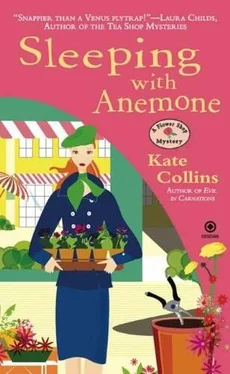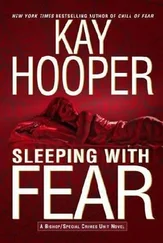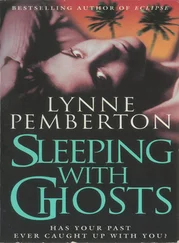Despite its flaws, I dearly loved the narrow, three-story redbrick building that housed Bloomers. Built around 1900, it had original wood floors, tin ceilings, and brick walls, giving the shop a cozy feeling modern structures simply couldn’t duplicate.
I took off my coat and hat and hung them on hooks along the wall behind the door. To my right was a small kitchen. Straight ahead, down the steep stairs, was a basement where we stored big pots, bags of potting medium, tall floral stands, and anything too large to fit in the workroom. Beyond the kitchen and tiny bathroom was the workroom, my favorite place in the whole world. And beyond that was the sales floor, also known as the shop, with a Victorian-inspired coffee-and-tea parlor in an adjacent room.
For a moment, I stood just inside the workroom doorway, breathing in the sweet floral aromas and basking in the coziness of the space. It was jam-packed with dried flowers, silk flowers, baskets, vases, and two huge, walk-in coolers filled with fresh flowers. It also held a desk with my computer equipment on it, a large worktable in the center, and rows of shelving on two walls. As my assistant, Lottie Dombowski, always said, “A place for everything and everything in its place.”
Before I forgot, I called the Hot Tix hotline and ordered three tickets for the Barrow Boys concert. I ended the call just as Lottie came through the purple curtain. She had on her usual pink sweatshirt, white jeans, and pink sneakers, and today her short, brassy curls sported silver barrettes.
Lottie owned Bloomers before I did. In fact, I worked for her during summers home from college, making deliveries and assisting in the workroom. She was a big woman with a big heart and a bigger family-four boys, quadruplets, who were about to turn eighteen.
Her husband, Herman, the love of her life, had developed a critical heart problem that racked up tens of thousands of dollars of medical bills. As a result, Lottie was forced to sell Bloomers to pay down the debt, so I decided to buy it, with the bank’s help, of course. Having just flunked out of law school and been jettisoned by Pryce, I needed a reason to get up in the morning, other than to stick pins in a rag doll with Pryce’s name on it. Now I had that reason-a mortgage the size of Texas.
“What are you doing back so early?” Lottie asked. “Did something happen?”
“You could say that.”
“Is that why you’re grinning from ear to ear?”
“No,” I said, and giggled. Giggled? Was I actually giddy at the thought of getting engaged? Was I twelve?
“You want to tell me about it? I’ll bet you didn’t have lunch yet, did you? Come on back to the kitchen and I’ll heat up some of the stew I brought in this morning. Grace can handle the front. The shop’s been quiet all morning.”
“Would you like coffee with your stew?” Grace asked, breezing into the workroom. I could always count on Grace to know exactly what was going on, mostly because she loved to eavesdrop. “I’ve got a fresh pot on. It’s got a touch of vanilla and a pinch of cinnamon in it today. And I made a batch of blueberry scones that will knock your socks off.”
Coffee and scones were two of Grace’s many specialties, along with her incredible instincts and her ability to keep our coffee-and-tea parlor humming along.
“I’d love both. Thanks.”
Grace Bingham was a sixtysomething Brit whom destiny kept throwing in my path. I’d first encountered her when she was the nurse at my elementary school. Later, she’d worked with one of my brothers as a surgical nurse at the hospital, and then as Dave Hammond’s secretary when I clerked for him. She finally retired last year, for about ten minutes, then grew bored and jumped at the chance to work at Bloomers.
I’d added the coffee-and-tea parlor as a way to draw in more customers, locating it in an unused storage room off the main shop, but Grace was the one who had created the Victorian theme that had become a hit on the town square. She brewed the best tea in town, had a secret recipe for coffee, and made fresh scones daily, the flavor depending on her mood.
We removed ourselves to the parlor so both women could hear about the Home and Garden Show mishap while I tucked into the steaming stew. I decided to save my news about our engagement discussion. They could process only so much information at a time.
“What a shame your mum’s red candy spoiled your stand against tyranny,” Grace said. She assumed her lecturer stance, holding the edges of her cardigan as though they were lapels. “As Thomas Jefferson said, ‘Enlighten the people, generally, and tyranny and oppressions of body and mind will vanish like spirits at the dawn of day.’ ”
“That’s what I’m trying to do,” I said with a sigh, “enlighten the people.”
“Sweetie, are you sure you want to go up against a giant food corporation?” Lottie asked. “You’re just one little gal.”
“PAR is behind me, Lottie. They’ve stopped Uniworld before.”
“But just how aggressive did Uniworld get those other times?”
“Why?”
Lottie left the room and returned with a letter-sized white envelope. “This was pushed under the door this morning.”
“Not another one!” As with the previous letters, my name was typed on the front in bold caps, with no stamp or return address. Inside would probably be the same demand for me to stop harassing the “poor farmer” so he could get on with the opening of his new dairy farm, which was how Uniworld was portraying their new operation. Except that this so-called poor farmer was actually a skilled manager who would be overseeing a large operation that in no way resembled a small dairy farm.
I tore open the envelope and unfolded a piece of plain white paper. Unlike the others, this missive had only one line on it: PLAY WITH FIRE, EXPECT TO BE BURNED.
Well, that was different.

Both women, reading the letter over my shoulder, gasped. I wasn’t exactly delighted myself, but because of my brave speech, I made a show of marching over to the waste can and letting it fall inside.
“Um, sweetie, you might want to let the cops see that one,” Lottie said. “You know, in case someone tries to burn down the building.”
“I agree with Lottie, dear,” Grace said. “Not to alarm you unduly, but the tone of this communiqué is rather dire, isn’t it? It sounds as though they’re growing exasperated with you. I wouldn’t casually dismiss it.”
“With no identifying marks of any kind, how would it help the cops?”
“Fingerprints. DNA. Matching the printer ink and font,” Lottie listed. She watched way too much CSI. Our police force didn’t even have a unified computer system, let alone the technology to match printer ink. And DNA? Forget it. The state lab was usually backed up two months or more on serious criminal investigations. An anonymous letter would rank somewhere around zero on their to-do list.
They gazed at me, waiting expectantly.
Fine. If it made them happy. I retrieved the letter and put it in my purse. “I’ll give it to Sergeant Reilly next time I see him.”
A knock on the front door made us all jump. It was the FedEx driver, signaling he had a delivery. I waved at him, mouthing, Meet you at the back door.
“I’ll go let him in,” Lottie said, and headed for the curtain that separated the display area from the workshop. “I know you have trouble with that door.”
“That reminds me,” I said. “I’ve got to find out why my door request is being ignored.”
“Which reminds me,” Grace said. “I’ve got to get a new key made. Mine is bent.”
Читать дальше













